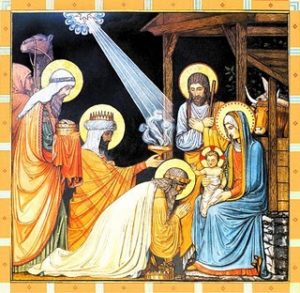The opening hymn for Epiphany 2017 is What Star is This, to Praetorius’ melody puer nobis.
Charles Coffin, born at Buzaney (Ardennes) in 1676, died 1749, was principal of the college at Beauvais, 1712, and rector of the University of Paris, 1718. He published in 1727 some of his Latin poems, for which he was already noted, and in 1736 the bulk of his hymns, including Quae stella sole pulcrior, appeared in the Paris Breviary of that year.
Quæ stella sole pulcrior
Coruscat? hæc Regis novi
Revelat ortus; hæc Dei
Præsignat ad cunas iter.
Stat vatibus priscis sides:
En stella surgit ex Jacob;
Arrectus ad spectaculum
Eous orbis emicat.
Dum sidus admonet foris,
Lux fulget intus clarior;
Suadetque vi blandâ Magos
Signi datorem quærere.
Segnes amor nescit moras;
Labor, pericla nil movent:
Domum, propinquos, patriam,
Deo vocante, deserunt.
Micante dum nos allicis,
O Christe, stellâ gratiæ;
Ne tarda cœlesti sinas
Obstare corda lumini.
Qui lumen est, sit laus Patri:
Qui se revelat Gentibus
Sit laus perennis Filio:
Par sit tibi laus, Spiritus.
Here is a rendition of the Latin original.
John Chandler, one of the most successful translators of hymns, was born at Witley in Surrey, June 16, 1806. He was educated at Corpus Christi College, Oxford, B.A. 1827, M.A. 1830. Ordained deacon in 1831 and priest in 1832, he succeeded his father as the patron and vicar of Whitley, in 1837. His first volume, entitled The Hymns of the Primitive Church, now first Collected, Translated and Arranged, 1837, contained 100 hymns, for the most part ancient, with a few additions from the Paris Breviary of 1736, including What star is this.
What star is this, with beams so bright,
more beauteous than the noonday light?
It shines to herald forth the King,
and Gentiles to his crib to bring.
True spake the prophet from afar
who told the rise of Jacob’s star;
and eastern sages with amaze
upon the wondrous token gaze.
The guiding star above is bright;
within them shines a clearer light,
and leads them on with power benign
to seek the Giver of the sign.
Their love can brook no dull delay,
Though toil and danger block the way;
Home, kindred, fatherland, and all
They leave at their Creator’s call.
O Jesus, while the star of grace
impels us on to seek thy face,
let not our slothful hearts refuse
the guidance of thy light to use.
To God the Father, heavenly Light,
to Christ, revealed in earthly night,
to God the Holy Ghost we raise
our equal and unceasing praise.
Chandler’s translation follows the neo-Latin original closely.
Here is a chamber choir rendition; here is a congregational rendition.
A Third-Century Roman Catacomb
“Severa, may you live in God”

